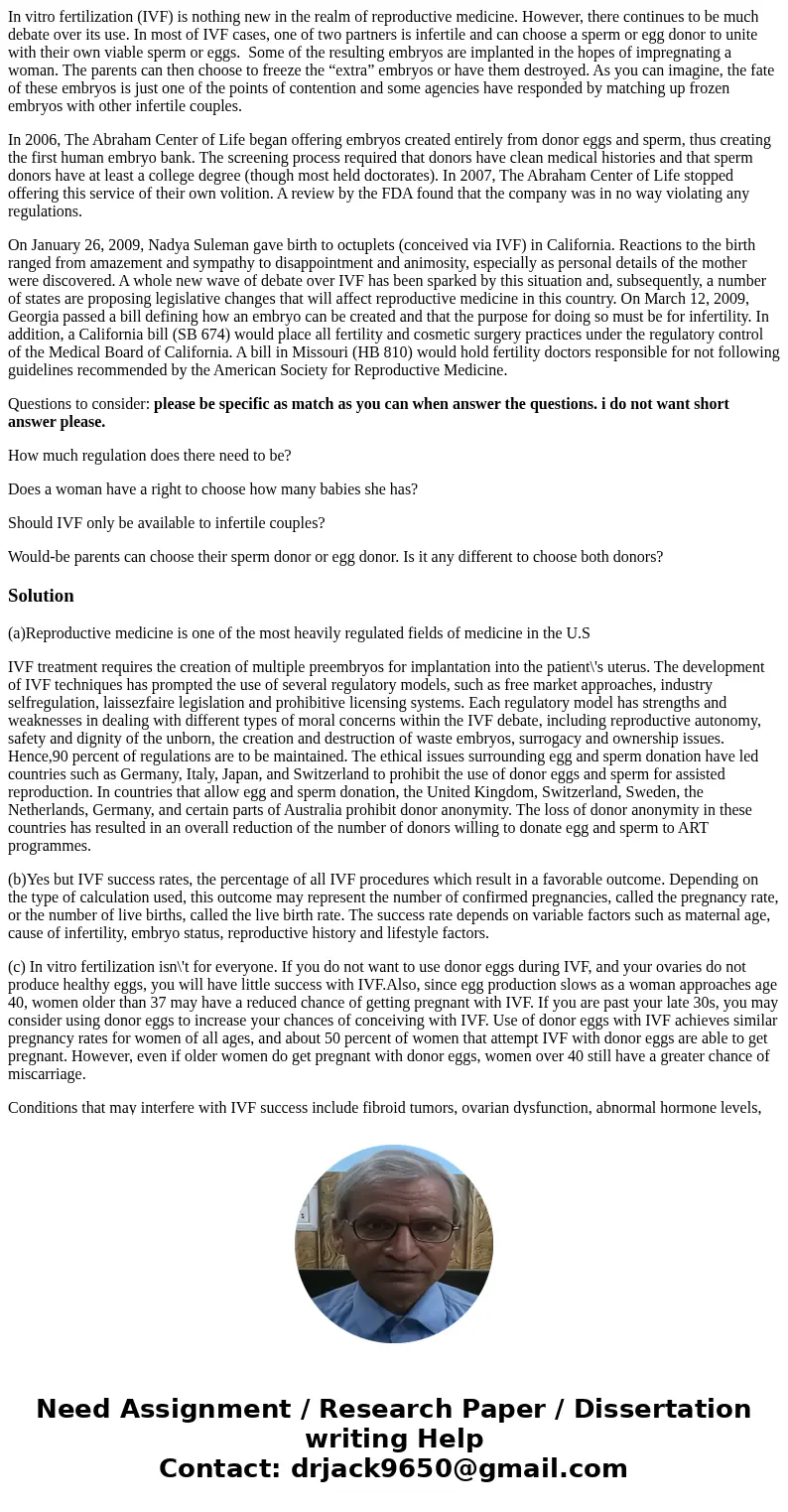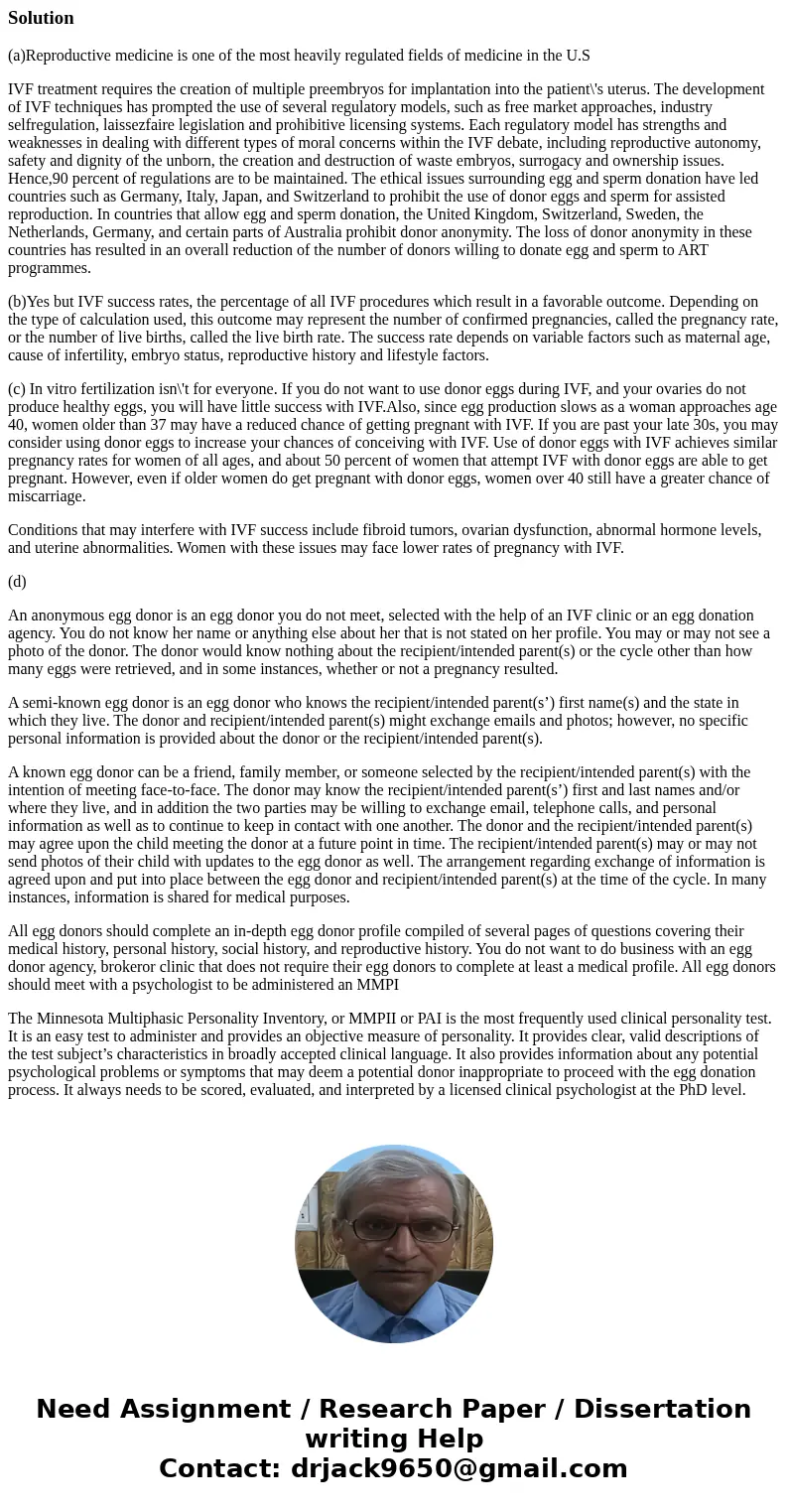In vitro fertilization IVF is nothing new in the realm of re
In vitro fertilization (IVF) is nothing new in the realm of reproductive medicine. However, there continues to be much debate over its use. In most of IVF cases, one of two partners is infertile and can choose a sperm or egg donor to unite with their own viable sperm or eggs. Some of the resulting embryos are implanted in the hopes of impregnating a woman. The parents can then choose to freeze the “extra” embryos or have them destroyed. As you can imagine, the fate of these embryos is just one of the points of contention and some agencies have responded by matching up frozen embryos with other infertile couples.
In 2006, The Abraham Center of Life began offering embryos created entirely from donor eggs and sperm, thus creating the first human embryo bank. The screening process required that donors have clean medical histories and that sperm donors have at least a college degree (though most held doctorates). In 2007, The Abraham Center of Life stopped offering this service of their own volition. A review by the FDA found that the company was in no way violating any regulations.
On January 26, 2009, Nadya Suleman gave birth to octuplets (conceived via IVF) in California. Reactions to the birth ranged from amazement and sympathy to disappointment and animosity, especially as personal details of the mother were discovered. A whole new wave of debate over IVF has been sparked by this situation and, subsequently, a number of states are proposing legislative changes that will affect reproductive medicine in this country. On March 12, 2009, Georgia passed a bill defining how an embryo can be created and that the purpose for doing so must be for infertility. In addition, a California bill (SB 674) would place all fertility and cosmetic surgery practices under the regulatory control of the Medical Board of California. A bill in Missouri (HB 810) would hold fertility doctors responsible for not following guidelines recommended by the American Society for Reproductive Medicine.
Questions to consider: please be specific as match as you can when answer the questions. i do not want short answer please.
How much regulation does there need to be?
Does a woman have a right to choose how many babies she has?
Should IVF only be available to infertile couples?
Would-be parents can choose their sperm donor or egg donor. Is it any different to choose both donors?
Solution
(a)Reproductive medicine is one of the most heavily regulated fields of medicine in the U.S
IVF treatment requires the creation of multiple preembryos for implantation into the patient\'s uterus. The development of IVF techniques has prompted the use of several regulatory models, such as free market approaches, industry selfregulation, laissezfaire legislation and prohibitive licensing systems. Each regulatory model has strengths and weaknesses in dealing with different types of moral concerns within the IVF debate, including reproductive autonomy, safety and dignity of the unborn, the creation and destruction of waste embryos, surrogacy and ownership issues. Hence,90 percent of regulations are to be maintained. The ethical issues surrounding egg and sperm donation have led countries such as Germany, Italy, Japan, and Switzerland to prohibit the use of donor eggs and sperm for assisted reproduction. In countries that allow egg and sperm donation, the United Kingdom, Switzerland, Sweden, the Netherlands, Germany, and certain parts of Australia prohibit donor anonymity. The loss of donor anonymity in these countries has resulted in an overall reduction of the number of donors willing to donate egg and sperm to ART programmes.
(b)Yes but IVF success rates, the percentage of all IVF procedures which result in a favorable outcome. Depending on the type of calculation used, this outcome may represent the number of confirmed pregnancies, called the pregnancy rate, or the number of live births, called the live birth rate. The success rate depends on variable factors such as maternal age, cause of infertility, embryo status, reproductive history and lifestyle factors.
(c) In vitro fertilization isn\'t for everyone. If you do not want to use donor eggs during IVF, and your ovaries do not produce healthy eggs, you will have little success with IVF.Also, since egg production slows as a woman approaches age 40, women older than 37 may have a reduced chance of getting pregnant with IVF. If you are past your late 30s, you may consider using donor eggs to increase your chances of conceiving with IVF. Use of donor eggs with IVF achieves similar pregnancy rates for women of all ages, and about 50 percent of women that attempt IVF with donor eggs are able to get pregnant. However, even if older women do get pregnant with donor eggs, women over 40 still have a greater chance of miscarriage.
Conditions that may interfere with IVF success include fibroid tumors, ovarian dysfunction, abnormal hormone levels, and uterine abnormalities. Women with these issues may face lower rates of pregnancy with IVF.
(d)
An anonymous egg donor is an egg donor you do not meet, selected with the help of an IVF clinic or an egg donation agency. You do not know her name or anything else about her that is not stated on her profile. You may or may not see a photo of the donor. The donor would know nothing about the recipient/intended parent(s) or the cycle other than how many eggs were retrieved, and in some instances, whether or not a pregnancy resulted.
A semi-known egg donor is an egg donor who knows the recipient/intended parent(s’) first name(s) and the state in which they live. The donor and recipient/intended parent(s) might exchange emails and photos; however, no specific personal information is provided about the donor or the recipient/intended parent(s).
A known egg donor can be a friend, family member, or someone selected by the recipient/intended parent(s) with the intention of meeting face-to-face. The donor may know the recipient/intended parent(s’) first and last names and/or where they live, and in addition the two parties may be willing to exchange email, telephone calls, and personal information as well as to continue to keep in contact with one another. The donor and the recipient/intended parent(s) may agree upon the child meeting the donor at a future point in time. The recipient/intended parent(s) may or may not send photos of their child with updates to the egg donor as well. The arrangement regarding exchange of information is agreed upon and put into place between the egg donor and recipient/intended parent(s) at the time of the cycle. In many instances, information is shared for medical purposes.
All egg donors should complete an in-depth egg donor profile compiled of several pages of questions covering their medical history, personal history, social history, and reproductive history. You do not want to do business with an egg donor agency, brokeror clinic that does not require their egg donors to complete at least a medical profile. All egg donors should meet with a psychologist to be administered an MMPI
The Minnesota Multiphasic Personality Inventory, or MMPII or PAI is the most frequently used clinical personality test. It is an easy test to administer and provides an objective measure of personality. It provides clear, valid descriptions of the test subject’s characteristics in broadly accepted clinical language. It also provides information about any potential psychological problems or symptoms that may deem a potential donor inappropriate to proceed with the egg donation process. It always needs to be scored, evaluated, and interpreted by a licensed clinical psychologist at the PhD level.


 Homework Sourse
Homework Sourse